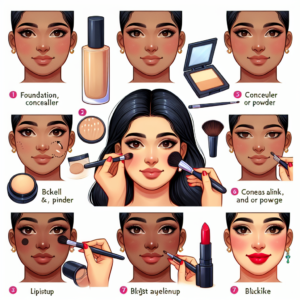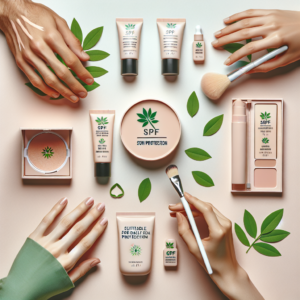
Key Takeaways
-
Non-comedogenic makeup doesn’t clog pores, making it ideal for acne-prone skin.
-
Ingredients like salicylic acid and zinc oxide can help manage breakouts and reduce inflammation.
-
Always remove makeup thoroughly to prevent acne flare-ups.
-
Consult with a dermatologist to find products tailored to your specific skin needs.
-
Healthy lifestyle habits, including diet and hygiene, play a crucial role in maintaining clear skin.
Non-Comedogenic Makeup for Acne-Prone Skin
When you have acne-prone skin, every product matters. You’re not just looking for makeup; you’re looking for a confidence booster that won’t make things worse. That’s where non-comedogenic makeup comes in. It’s designed to give you the coverage you want without clogging your pores, which is a common trigger for breakouts. But navigating the sea of products can be overwhelming. Let’s dive in and clear up the confusion.
What Does Non-Comedogenic Mean?
Non-comedogenic is a term you’ve probably seen on various skincare and makeup products, but what exactly does it mean? Simply put, it means that the product is formulated in a way that is unlikely to cause pore blockages and, consequently, acne breakouts. These products are tested and proven to minimize the risk of clogging pores, which is essential for maintaining clear skin. However, keep in mind that everyone’s skin is unique, so what works for one person might not work for another.
Why It Matters for Acne-Prone Skin
For those of us with acne-prone skin, every ingredient in our makeup bag counts. Acne is often caused or exacerbated by clogged pores, which can be the result of using the wrong makeup. Non-comedogenic products are specifically designed to prevent this issue, helping to manage breakouts and maintain a smooth complexion. Besides that, they often contain ingredients that can actually help improve the condition of your skin.
Top Non-Comedogenic Makeup Products
Let’s talk about some of the top players in the non-comedogenic makeup game. These products have earned their spot for being gentle on the skin while providing the desired aesthetic effects.
Cleansers and Moisturizers
Before we even touch on makeup, it’s crucial to start with a clean canvas. A good non-comedogenic cleanser will remove impurities without stripping your skin of its natural oils. Follow up with a non-comedogenic moisturizer, which hydrates your skin without contributing to further breakouts. Look for products containing ingredients like hyaluronic acid or glycerin, which provide moisture without heaviness.
Foundations and Concealers
When it comes to foundation and concealer, the goal is to achieve a flawless look without aggravating your skin. There are plenty of options out there, from powders to liquids, all promising to cover imperfections without causing congestion. I recommend mineral-based formulas or those with added skin-benefit ingredients like salicylic acid, which can help to gently exfoliate the skin and keep breakouts at bay.
Here’s a brief example of how different products can suit various needs:
“For instance, Jane, a friend of mine with sensitive and acne-prone skin, switched to a mineral powder foundation. Not only did it provide good coverage, but the zinc oxide in the formula helped to soothe her skin and reduce redness.”
Setting Powders and Sprays
To lock in your look and control shine throughout the day, setting powders and sprays can be your best friend. Opt for translucent powders that minimize shine without adding extra layers of makeup. Non-comedogenic setting sprays can also provide a refreshing, long-lasting hold, perfect for keeping everything in place without contributing to acne.
Mineral-Based Ingredients
Mineral-based makeup is a godsend for acne-prone skin. It’s made from natural minerals like zinc oxide and titanium dioxide which are gentle on the skin and provide natural sun protection. These ingredients are non-irritating and have anti-inflammatory properties, making them perfect for sensitive skin types. A good mineral foundation will not only cover redness and blemishes but also help to soothe and protect your skin.
Negative-List: Ingredients to Avoid
While we’re on the topic of ingredients, let’s talk about what to steer clear of. Certain ingredients can trigger breakouts or worsen acne. Common culprits include coconut oil, isopropyl myristate, and synthetic fragrances. They might be present in makeup and skincare products, so it’s essential to read labels carefully. If you’re unsure about an ingredient, a quick online search or a chat with your dermatologist can provide clarity.
Application Tips for Acne-Prone Skin
Applying makeup to acne-prone skin can feel like navigating a minefield—you want to look good, but you don’t want to cause more breakouts. Here are some tips to help you apply makeup safely and effectively.
Prepping Your Skin
Before applying makeup, ensure your skin is clean and moisturized. Use a gentle, non-comedogenic cleanser and follow up with a light moisturizer. This helps create a smooth base for your makeup and protects your skin from being overwhelmed by the products you’re about to apply.
The Right Way to Apply Foundation
When applying foundation, use a clean brush or sponge to avoid introducing bacteria to your skin. Start with a small amount of product and build up gradually—this helps you achieve the coverage you need without layering on too much product. Also, be sure to blend well, especially around the jawline and hairline, to avoid any harsh lines.
Another tip is to look for foundations with buildable coverage. This way, you can apply a lighter layer on good skin days and add more when you need extra coverage without risking irritation.
Remember, the goal is to enhance your skin, not mask it. So, choose a foundation shade that matches your skin tone closely. This will help the makeup look natural and make you feel more confident about your appearance.
-
Use a gentle, non-comedogenic cleanser to clean your face.
-
Apply a light moisturizer to create a smooth base for makeup application.
-
Use clean tools to apply foundation to avoid bacterial transfer.
-
Opt for buildable coverage to adjust the amount of product according to your skin’s needs.
-
Choose a foundation shade that closely matches your skin tone for a natural look.
Removing Makeup Without Causing Breakouts
At the end of the day, it’s crucial to remove your makeup thoroughly to prevent breakouts. Use a gentle makeup remover or micellar water designed for sensitive skin. Follow up with your regular cleansing routine to ensure all traces of makeup are gone. This is key to keeping your skin clear and allowing it to breathe and recover overnight.
For stubborn makeup, consider using an oil-based cleanser as part of a double-cleansing method. The oil helps break down makeup without harsh scrubbing, which can irritate acne-prone skin. Just make sure to choose an oil cleanser that’s non-comedogenic and suitable for your skin type.
Treating Acne While Wearing Makeup
Wearing makeup doesn’t mean you have to put treating your acne on hold. In fact, some makeup products contain ingredients that can help combat acne. Look for products with salicylic acid, which can help unclog pores, or sulfur, which has natural antibacterial properties.
Daytime Skincare Regimens
During the day, your skincare routine should focus on protection and prevention. After cleansing and moisturizing, apply a non-comedogenic sunscreen with at least SPF 30. This helps protect your skin from the sun’s harmful UV rays, which can exacerbate acne and cause post-inflammatory hyperpigmentation (dark spots left behind after acne clears).
Also, consider using a primer with acne-fighting ingredients before your foundation. This creates an additional barrier between your skin and makeup, which can help control oil and prevent breakouts.
Nighttime Skincare Routines
At night, your skincare routine should focus on treatment and repair. After removing your makeup, apply products that contain active ingredients like retinoids, which can help speed up cell turnover and prevent clogged pores. Be sure to follow up with a hydrating, non-comedogenic moisturizer to keep your skin balanced.
-
Use a gentle makeup remover or micellar water to remove makeup.
-
Consider an oil-based cleanser for double-cleansing if you wear heavy makeup.
-
Apply acne-fighting ingredients during the day for ongoing treatment.
-
Use a primer with salicylic acid to prevent breakouts.
-
At night, focus on active ingredients like retinoids for treatment and repair.
Sticking to a consistent skincare routine, even when wearing makeup, can make a significant difference in the health and appearance of your skin.
Makeup and Lifestyle Habits for Healthier Skin

Your makeup choices are just one part of the equation when it comes to managing acne-prone skin. Lifestyle habits also play a crucial role. Let’s explore how diet, hydration, and exercise can impact your skin’s health.
Diet and Hydration
What you eat affects your skin. Foods high in sugars and dairy can sometimes trigger acne in certain individuals. Instead, focus on a balanced diet rich in fruits, vegetables, lean proteins, and whole grains. These foods contain vitamins and antioxidants that are beneficial for your skin. Most importantly, stay hydrated. Drinking plenty of water helps flush out toxins and keeps your skin hydrated from the inside out.
Exercise and Skin Detox
Regular exercise is not only great for your overall health but also for your skin. It increases blood flow, which helps nourish skin cells and keep them vital. Sweat also helps to flush out impurities from your skin. Just remember to cleanse your face after a workout to remove sweat and bacteria to prevent new breakouts.
By combining the right non-comedogenic makeup products with healthy lifestyle choices, you can manage acne-prone skin effectively and feel confident in your skin every day.
Expert Reviews

It’s always reassuring to hear from experts in the field, especially when it comes to something as personal as your skin. Dermatologists and makeup artists alike have weighed in on the best practices and products for acne-prone skin. Most importantly, they emphasize the importance of knowing what’s in your makeup and understanding how it interacts with your skin.
They recommend opting for products with a short ingredient list, as fewer ingredients mean fewer chances for irritation or breakouts. Additionally, experts suggest looking for makeup that has skin-benefit ingredients incorporated into their formulas, such as niacinamide, which can help reduce inflammation and improve skin texture over time.
Non-Comedogenic Product Lines
There are several makeup brands that have dedicated themselves to creating non-comedogenic product lines. These brands understand the struggle of finding makeup that won’t contribute to acne and have formulated their products accordingly. Brands like Neutrogena, Bare Minerals, and Clinique have all been praised for their non-comedogenic offerings that cater to acne-prone skin without sacrificing performance or variety in their product lines.
What Dermatologists Recommend
Dermatologists recommend that individuals with acne-prone skin should not only use non-comedogenic makeup but also incorporate products with active ingredients that can treat acne while wearing makeup. They advise looking for labels that contain salicylic acid, benzoyl peroxide, or sulfur. These ingredients help to combat acne directly, and when included in makeup, they can provide treatment throughout the day.
Frequently Asked Questions (FAQ)
Q: Can makeup cause acne?
A: Yes, makeup can cause acne if it clogs your pores or if you’re allergic to certain ingredients. That’s why choosing non-comedogenic makeup is crucial for acne-prone skin.
It’s not just about choosing the right products, but also about how you use them. Always apply makeup to a clean face, use clean brushes, and remove makeup thoroughly at the end of the day.
Understanding your skin type and sensitivities is key to preventing makeup-related breakouts. If you notice your skin reacting poorly to a new product, discontinue use immediately and consult with a dermatologist if necessary.
Additionally, maintaining clean makeup tools is essential. Brushes and sponges can harbor bacteria, which can lead to breakouts. Wash your tools regularly with a gentle soap to keep them – and your skin – clean.
Can makeup cause acne?
Yes, certain types of makeup can cause acne, especially if they are not non-comedogenic. Products that are heavy or oil-based can clog pores and lead to breakouts. It’s crucial to choose products that are labeled non-comedogenic and to pay attention to how your skin reacts to new products.
How do I know if a product is truly non-comedogenic?
To ensure a product is truly non-comedogenic, check the ingredient list for common pore-clogging culprits and avoid them. Also, look for products that have been clinically tested on acne-prone skin. When in doubt, consult with a dermatologist who can provide personalized advice based on your skin’s needs.
It’s also worth noting that non-comedogenic is not a regulated term, so it’s important to do your research and perhaps test the product on a small area of your skin before using it fully.
Are there any non-comedogenic DIY makeup recipes?
While DIY makeup recipes can be fun and natural, it’s challenging to ensure they are non-comedogenic without proper testing. If you’re interested in DIY options, focus on simple recipes with ingredients known to be safe for acne-prone skin, like aloe vera or arrowroot powder. However, for the most reliable results, it’s best to stick with commercially available, dermatologist-approved products.
What should I do if I experience a breakout from makeup?
If you experience a breakout after using a new makeup product, stop using the product immediately. Go back to a simple skincare routine with products you know are safe for your skin. If the breakout persists, consult a dermatologist for treatment options. They may be able to prescribe topical treatments or suggest over-the-counter products that can help clear up the acne.
How often should I clean my makeup brushes and sponges?
Cleaning your makeup brushes and sponges is crucial for preventing acne. Ideally, brushes and sponges should be cleaned after every use, but at a minimum, once a week. Use a gentle cleanser or brush shampoo and allow them to dry completely before using them again. This will help prevent the buildup of bacteria and product residue, which can lead to breakouts.
Remember, taking care of your skin doesn’t stop at the products you apply; it extends to the tools you use to apply them. Keeping everything that touches your skin clean will significantly reduce the risk of acne.




